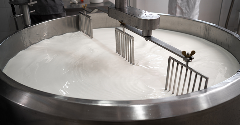News
Brits continue to embrace plant-based milk
22 Jul 2019From almond to oat and coconut to pea, plant-based milk alternatives are causing something of a stir, as latest research from Mintel reveals Brits are branching out in their milk tastes.
Almost a quarter (23%) of Brits used plant-based milk alternatives in the three months to February 2019, up from just 19% in 2018.

Driving the plant-based revolution, some 26% of women enjoy plant-based milk alternatives and as many as a third (33%) of 16-24s opt for these varieties. Growth of milk alternatives is largely fuelled by more recent category entrants such as oat (volume sales of which grew 71% between 2017), coconut (up 16% between 2017-18) and almond variants (up 10% between 2017-18), all of which have grown in visibility as well as availability in 2018.
But while plant-based milk alternatives continue to grow in popularity, according to Mintel research, they accounted for just 4% of volume sales and 8% of value sales of white milk in 2018. Furthermore, their use in cooking and hot drinks remains limited. Only 25% of plant-based milk alternatives consumers use these products in cooking, compared to 42% for standard cow’s milk users. The difference is even wider with hot drinks, where just 42% of plant-based milk alternatives consumers use them in hot drinks, compared to 82% for standard cow’s milk users. Nevertheless, a fifth (21%) of Brits believe nut milks add more flavour to drinks than cow’s milk.
Highlighting that there are more opportunities for further growth in the plant-based milk alternatives trend, 65% of plant-based milk users would welcome advice on how to use plant-based milk/cream alternatives in cooking/baking – with 24% of non-users also interested in such advice.
Emma Clifford, Associate Director of UK Food and Drink, said: “Plant-based milk alternatives continue to make further inroads into the mainstream, with high levels of innovation activity such as the entrance of Innocent Drinks to the market in 2018. Growth in this segment forms part of a much wider plant-based movement, driven by concerns around health, ethics and the environment, as well as by consumers’ love of variety in their diets.”
“The shift towards the higher-priced plant-based alternatives will carry on, helping to add value to the market overall. Consumer interest in advice on how these alternatives suit different usage occasions signals marked potential to boost usage among current users and non-users alike.”
Traditionally a household staple, usage of standard cow’s milk is sliding among 16-24-year-olds, falling from 79% in 2018 to 73% in 2019. While cow’s milk still accounted for the vast majority of white milk sales in 2018 (96%), usage of this family favourite is increasingly skewed towards older consumers, peaking at 92% among over-45s.
This fall in usage among 16-24s comes as 37% of this age group say they have reduced how much standard cow’s milk they have used in the last 12 months for health reasons. Environmental concerns are also playing a role, with 16-24s most likely (36%) to agree that dairy farming has a negative impact on the environment. The significantly lower usage of cow’s milk among the younger generation is also in line with these consumers being most likely to report dairy avoidance in their household, at 26% of under-35s.
“With volume sales of cow’s milk already on a downward trend, the fact that more young consumers are turning away from these products does not bode well for this segment’s prospects in the long-term. Efforts from the industry to remind young consumers of the benefits of using cow’s milk, and dairy more widely, for example in terms of health, are needed,” said Cliff.
Mintel research highlights the importance of ethics and the environment for the milk and dairy industry as a third (33%) of milk, milk drinks and cream users are interested in products in a bottle/pot made wholly/partly of recycled plastics. Meanwhile, a quarter (27%) of users are interested in products with a guarantee of sustainable farming. Around one in seven (15%) users would be interested in products with an on-pack statement of how many days the animals spent outside.
“Media coverage of the ethical and environmental issues around animal farming have helped raise consumer awareness of these factors. Ethical interest is of significant importance to the dairy drinks, milk and cream sector, particularly as in this market differentiation is challenging. Interest in ethical products – including those that use recycled plastics, plastic waste reduction, sustainable farming, and support animal welfare – offers opportunities to engage with consumers, create compelling points of difference and encourage people to spend a bit more money,” said Cliff.
Finally, as many as 40% of standard white cow’s milk users would pay more than £1.20 for a four-pint bottle of milk, up from 35% in 2018. The price for a four-pint bottle of standard own-label milk stood at around £1.10 in April 2019, the same as in March 2018.
“This attitude aligns closely with our research which shows that 44% of people say small price rises in milk do not matter and reflect milk’s relatively small role in the overall grocery budgets,” said Cliff.
Related news

Consumers dislike faba beans’ sensory profile
3 Jun 2024
Consumers display low acceptance of faba beans, with sensory properties such as bitterness a core concern, a study suggests. However, for product varieties such as cocoa-free chocolate, this attribute could prove to be a benefit.
Read more
Food scientists uncover new way to preserve nutrient and flavour quality
29 May 2024
Researchers have developed a method that guarantees food safety for low-moisture products, such as dried milk, while maximising quality by retaining vitamins, minerals, and flavours, they say.
Read more
FDA scrutinizes milk pasteurisation over HPAI risk
28 May 2024
The US Food and Drug Administration (FDA) is undertaking additional scientific research work to ensure that approved pasteurization processes are rigorous enough after retailer milk tests showed contamination from Highly Pathogenic Avian Influenza (HPA...
Read more
Magnum targets ice cream lovers’ moods with new flavours
2 May 2024
Unilever-owned Magnum has released a suite of “mood-inspired flavours” as the 2024 ice cream season kicks off. The offerings, marketed as the Magnum Pleasure Express, are Magnum's first foray into the “mood-food” category.
Read more
The eight global food trends shaping the future of dining
23 Apr 2024
Unilever’s Future Menu Trend 2024 report identifies the global food trends shaping the food service industry, providing insights into changing consumer preferences that could provide inspiration for packaged food and drink brands.
Read more
Report outlines how the US interfered with marketing restrictions on formula across the globe
18 Apr 2024
A recent investigative report by ProPublica unmasked the extensive interference by the US government in international regulations concerning the marketing of formula.
Read more
Ultra-processed food intake in South Africa at concerning levels, study suggests
19 Mar 2024
As South Africa considers introducing front-of-pack warning labels and strict marketing limits for unhealthy foods, research has found that low-income South Africans get around half of their calories from ultra-processed foods (UPFs) – “a cause for con...
Read more
India’s mithai market develops new ingredient and flavour profiles
18 Mar 2024
Mithai is a hugely popular dessert and sweet snack in India and manufacturers are experimenting with unique ingredients, new flavour combinations, and healthier versions to capture new audiences.
Read more
Unilever and Perfect Day’s animal-free dairy dessert: Is precision fermentation the future of dairy?
6 Mar 2024
Perfect Day, a precision fermentation dairy supplier, has partnered with Unilever's Breyers, a brand of ice cream and frozen dairy desserts, to launch Breyers lactose-free chocolate frozen dessert.
Read more
Macauba oil emerges as potential rainforest-friendly palm oil alternative
1 Mar 2024
Producers and researchers consider the rainforest-friendly credentials of Macauba palm oil and whether its sustainability credentials offer an opportunity to replace palm oil.
Read more